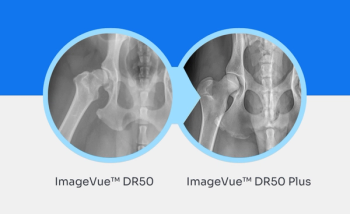
First dog receives combination immunotherapy in new cancer trial
A new pilot clinical study will explore the safety and effectiveness of 2 anti-canine monoclonal antibodies on solid tumors in dogs.
Researchers are now exploring whether a combination of 2 immunotherapy drugs are effective against canine patients with cancer. At the University of Wisconsin, the first canine patient was administered the initial dose of a dual immune checkpoint therapy, marking the launch of a pilot clinical study on the efficacy of dual immune checkpoint inhibitors for treating dogs with solid tumors.
The study, called “Checkmate K9” and launched by pet biotechnology company Vetigenics, will assess the safety and early effectiveness of VGS 001 in conjunction with VGS 002 in dogs with a variety of solid tumors. VGS 001 is an anti-canine CTLA-4 (anti-cCTLA-4) monoclonal antibody and VGS 002 is an anti-canine PD-1 (anti-cPD-1) monoclonal antibody.
According to Vetigenics, the research was inspired by dual immune checkpoint inhibitor studies in human cancer.1 In human medicine, the combination of anti-CTLA-4 and anti-PD-1 monoclonal antibodies have shown stronger anti-tumor efficacy, with one study demonstrating an increased 5-year survival rate in human patients with advanced melanoma receiving anti-CTLA-4 combined with anti-PD-1 checkpoint inhibitors.2
Vetigenics called the launch of its Checkmate K9 a “major advancement” in veterinary oncology.1 “As single agents, these antibodies have shown strong safety and tolerability results, as well as encouraging therapeutic responses,” said Adriann Sax, CEO of Vetigenics, in a company news release.1 “We now have an exciting opportunity to advance our understanding of [immune checkpoint inhibitor] combination therapy in pet dogs. Vetigenics' vision is to ultimately bring these innovative treatments to pet parents as an accessible and affordable option in combating a variety of canine cancers,”
Seven veterinary oncology researchers across multiple academic centers and one animal hospital will be involved in the multisite, open-label evaluation. These individuals are1:
- Jeff Bryan, DVM, PhD, DACVIM (Oncology), with the University of Missouri
- Tim Fan, DVM, PhD, DACVIM (SAIM), DACVIM (Oncology), with the University of Illinois Urbana-Champaign
- Cheryl London, DVM, PhD, DACVIM (Oncology), with Tufts University
- Nicola Mason, BVetMD, PhD, DACVIM (SAIM), FRCVS, with the University of Pennsylvania
- Doug Thamm, VMD, DACVIM (Oncology), with Colorado State University
- Chelsea Tripp, DVM, MS, DACVIM (Oncology), medical director and owner of Bridge Animal Referral Center in Washington
- David Vail, DVM, MS, DACVIM (Oncology), with the University of Wisconsin
"Advancing immunotherapy options for our canine patients is a critical step forward," said Vail, principal investigator of the study and a distinguished leader in canine cancer care.1 "By exploring dual checkpoint blockade in dogs, we're doing two important things—giving veterinarians better tools to fight aggressive tumors in pets, and building a stronger bridge between animal and human cancer research. The insights we gain here can truly advance cancer treatment across species."
References
- Vetigenics launches CHECKMATE K9, first dual immune checkpoint inhibitor study in dogs with solid tumors. News release. Vetigenics. June 25, 2025. Accessed July 16, 2025. https://prnmedia.prnewswire.com/news-releases/vetigenics-launches-checkmate-k9first-dual-immune-checkpoint-inhibitor-study-in-dogs-with-solid-tumors-302491010.html
- Larkin J, Chiarion-Sileni V, Gonzalez R, et al. Combined nivolumab and ipilimumab or monotherapy in untreated melanoma. N Engl J Med. 2019;381(2):153-165. doi:10.1056/NEJMoa1910836
Newsletter
From exam room tips to practice management insights, get trusted veterinary news delivered straight to your inbox—subscribe to dvm360.





